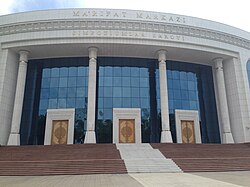| National Library of Uzbekistan | |
|---|---|
| Alisher Navoiy nomidagi O'zbekiston Milliy Kutubxonasi (Uzbek) Национальная библиотека Узбекистана имени Алишера Навои (Russian) | |
 Main building in Tashkent | |
 | |
| Location | Tashkent, |
| Type | National library |
| Established | 1870 |
| Service area | 41°19′01″N69°16′29″E / 41.317006231669936°N 69.27480399382613°E |
| Collection | |
| Items collected | Books, journals, newspapers, magazines, official publications, sheet music, sound and music recordings, databases, maps, postage stamps, prints, drawings, manuscripts and media. |
| Legal deposit | Yes |
| Other information | |
| Website | www |
The National Library of Uzbekistan is the legal deposit and copyright library for Uzbekistan. [1]